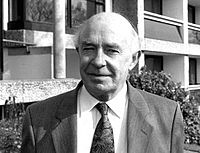David Smith (botanist) facts for kids
Sir David Cecil Smith (born 21 May 1930 – 29 June 2018) was a British botanist. He was famous for his important research into how different living things work together, a process called symbiosis. Smith became a top expert in this field.
He discovered that lichens (which are a mix of fungi and algae) and Radiata (simple sea creatures like jellyfish) used similar ways to get and use energy from their partnerships. His further studies showed that many other organisms living in symbiotic relationships also shared these basic biological processes.
Quick facts for kids
Sir David Smith
|
|
|---|---|
 |
|
| Principal of Edinburgh University | |
| In office 1987–1994 |
|
| President of Wolfson College, Oxford | |
| In office 1994–2000 |
|
| Born |
David Cecil Smith
21 May 1930 |
| Died | 29 June 2018 (aged 88) |
| Nationality | British |
| Education | Colston's School St Paul's School, London |
| Alma mater | University of Oxford |
| Known for | Discovery that organisms in symbiotic relationship, had similar biological processes. |
| Spouse(s) | Daphne Osborne (divorced); Lesley Mutch |
| Children | Bryony, Adam and Cameron |
| Awards | Linnean Gold Medal |
| Scientific career | |
| Fields | Botany |
| Institutions | University of California, Berkeley University of Oxford University of Bristol University of Edinburgh |
| Doctoral students | Angela Gallop |
Contents
Early Life and School Days
David Smith was the younger of two sons. His father, William Smith, was a mining engineer. His mother, Elva, was a teacher. David's older brother, Frank, sadly died in Canada.
His father first worked in coal mines in South Wales. After a big strike in the UK in 1926, he got a job managing a Manganese mine in the Sinai desert. The family lived in the Sinai desert until the end of World War II.
David was born during one of his parents' visits back to the UK. He lived in the Sinai desert until he was five years old. Then, he returned to the UK to live with his grandparents and aunt in Port Talbot, where he went to primary school.
When David was ten, he went to a boarding school called Colston's School in Bristol. At 15, his parents moved back to the UK and lived in London. David then moved to St Paul's School, London to finish his education.
It was at St Paul's School that David became very interested in biology, especially during school trips. He first planned to study medicine at the University of Oxford. However, he found out he could get financial help from a special scholarship to study botany (the study of plants) at The Queen's College, Oxford. So, he changed his plans.
In 1951, he earned a Bachelor of Arts degree in Botany with top honors. Right after that, he started advanced research on lichens and earned his D.Phil. (Doctor of Philosophy) degree in 1954. This is a very high academic degree.
Career and Research Discoveries
David Smith finished his D.Phil. degree quickly, in just two years, because he was about to start his National service (military service). He spent his time in Germany, working for the Intelligence Corps to research Nuclear warfare.
After his national service, he became a research fellow at The Queen's College, Oxford. Then, he went to the United States on a special fellowship to do research at the University of California, Berkeley.
Smith returned to the UK and became a university lecturer at the University of Oxford. From 1964 to 1971, he was a Royal Society Senior Research Fellow at Wadham College, Oxford. He then became a Tutorial Fellow and Admissions Tutor at the same college. One of his former students, Angela Gallop, became a famous forensic scientist.
In 1965, he joined the team that edited the plant science journal New Phytologist. He soon became the main editor for 17 years and continued to be involved with the journal for many more years.
From 1974 to 1980, Smith was a professor of Botany at the University of Bristol. He returned to Oxford in 1980 as the Sibthorpian Professor of Rural Economy and also directed the Department of Agricultural Science.
From 1987 to 1994, Sir David Smith was the Principal (like the head) of the University of Edinburgh. After that, from 1994 to 2000, he was the President of Wolfson College, Oxford. In 2002, he became an Honorary Fellow of Wadham College, Oxford.
Awards and Recognition
Sir David Smith received many honors for his work. In 1993, he was given an honorary doctorate from Heriot-Watt University. He was chosen as a fellow of the Royal Society in 1975, which is a very high honor for scientists in the UK. He was also the biological secretary for the Royal Society from 1983 to 1987.
In 1986, he was awarded a knighthood, which means he could use the title "Sir." The Linnean Society gave him the Gold Medal for Botany. He also served as the president of this society from 2000 to 2003. In 2003, he received the Acharius Medal for his work on lichens.
Family Life
Sir David Smith was married twice. He first married plant scientist Daphne Osborne in 1959, but they later divorced. In 1965, he married Lesley Mutch, a Scottish doctor. They had three children together: Bryony, Adam, and Cameron. After he retired in 2000, the family moved back to Morningside in Edinburgh.
 | Jewel Prestage |
 | Ella Baker |
 | Fannie Lou Hamer |

